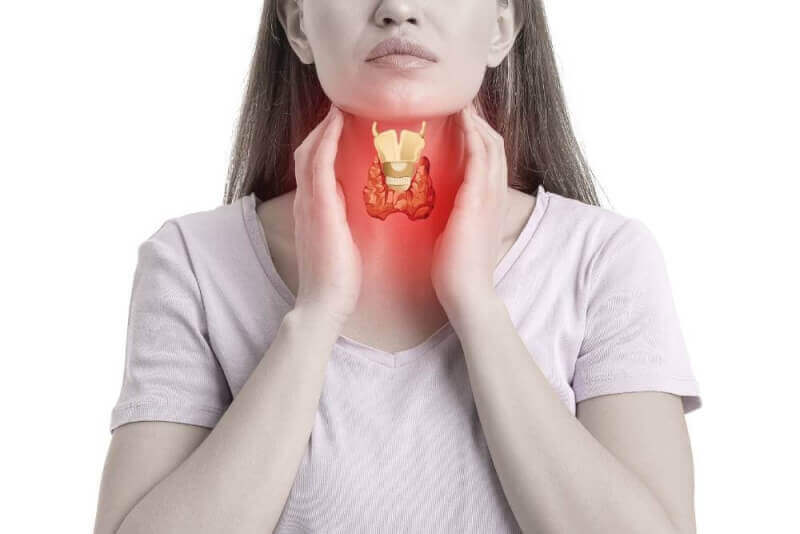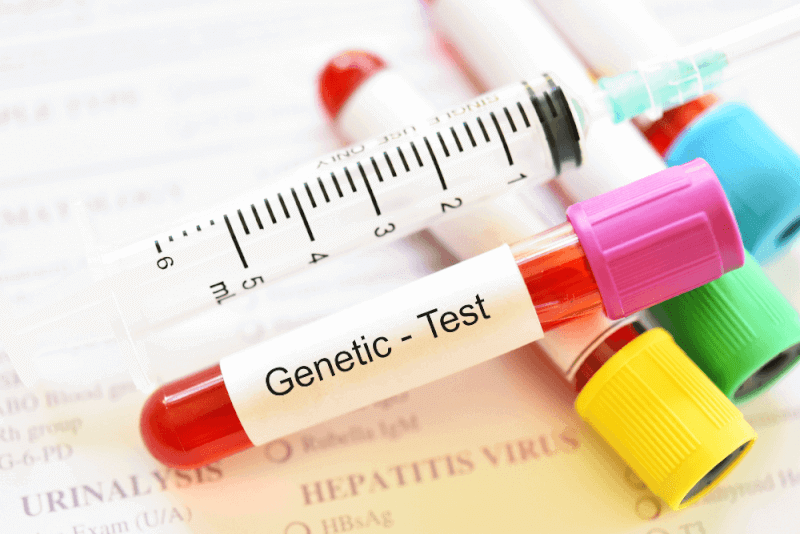30-Second Summary
- The thyroid gland is a small gland that secretes T3 and T4 hormones, which regulate the body's metabolism.
- Imbalance in thyroid hormone secretion causes thyroid diseases.
- Common symptoms include weight loss, weight gain, fatigue, irritability, skin changes, and heart palpitations.
- Benign thyroid diseases include goiter, hypothyroidism.
What Are Thyroid Diseases?
The thyroid gland, a gland weighing about 25-40 grams located in the front part of the windpipe in human anatomy, has very important functions in human life despite its small size. One of the main tasks of the thyroid gland is the secretion of T3 and T4 hormones, which regulate the body's metabolism.
The thyroid gland must achieve absolute balance while secreting T3, T4, and other hormones. Because secretion of hormones below or above normal levels can cause the organs in the body to function quickly or slowly.
The thyroid gland actually regulates its functioning thanks to the Thyroid Stimulating Hormone (TSH), which is an order hormone coming from the pituitary gland. While the thyroid gland secretes T3 and T4 hormones thanks to TSH, these hormones regulate metabolism, especially the functioning of the immune system. Thyroid diseases can occur due to imbalances affecting many different points, such as child development in the womb, regulation of sugar, fat, and protein metabolism in adulthood, heart rate, and body temperature.
What Are the Symptoms of Thyroid Diseases?
There is a high likelihood of encountering dozens of symptoms that can be listed extensively in diseases that may arise due to the thyroid gland secreting T3 and T4 hormones excessively or in very low amounts. The general symptoms that can be listed appear with the condition of hormone secretion being low (hypothyroidism), including:
- Hypertension
- Skin moisture
- Increased hand tremors
- Persistent diarrhea
- Sleep problems
- Menstrual problems in women
- Intolerance to hot weather
- Weight loss
- Dilation of pupils
- Excessive sweating
- Intense heart palpitations
- Frequent irritability
- Hair loss and weakening
- Thinning of the skin
- Forgetfulness
- Loss of sexual desire and performance issues
- Depression
- Voice disorders
- Anger outbursts
- Excessive coldness
- Shortness of breath.
On the other hand, when looking at the symptoms that can arise from excessive hormone secretion (hyperthyroidism), the exact opposite of all these symptoms can occur. In other words, weight gain, dry skin, lack of sweating, extreme lethargy, or very low blood pressure may be encountered. Additionally, symptoms such as experiencing constipation, cessation of menstruation in women, or encountering edema can be listed.
What Are the Causes of Thyroid Diseases?
Among the most important causes of diseases that can be encountered in the thyroid gland are iodine deficiency and genetic predisposition. Particularly, iodine deficiency, which needs special attention, causes problematic situations in the thyroid gland, and it is observed that iodine consumption is low in our country.
Hypothyroidism; the condition is caused by inflammation of the thyroid gland, encountering Hashimoto's thyroiditis, iodine deficiency, the thyroid gland not functioning from birth, or the formation of postpartum thyroiditis can lead to diseases.
When looking at the causes behind hyperthyroidism, thyroid nodules, excess iodine, Graves' disease, and thyroiditis can be seen as causes of the disease.
Thyroid Diseases in Children
Under normal conditions, the pituitary gland secretes the TSH hormone, which ensures that the thyroid hormone is closely monitored and its amount regulated. This ensures that there is always a sufficient amount of thyroid hormone in the body. However, in the presence of low thyroid hormone with high TSH hormone, hypothyroidism occurs, and in the presence of high thyroid hormone with low TSH hormone, hyperthyroidism occurs. The most common thyroid disorders seen in children include:
- Hypothyroidism
- Medullary thyroid cancer
- Graves' disease
- Multiple endocrine neoplasia type 2
- Thyroid nodules
- Differentiated thyroid cancer
The rare thyroid diseases seen in children include:
- DICER1 syndrome
- Familial adenomatous polyposis
- PTEN hamartoma tumor syndrome
Symptoms of Thyroid Diseases in Children
Symptoms of thyroid diseases in children can be seen from birth or develop during childhood. While the symptoms that can be seen in children vary according to the diseases, the common symptoms include:
Symptoms seen in infants and children with excessive thyroid hormone secretion include:
- Excessively fast pulse
- Red skin
- Moist skin
- Excessive appetite
Symptoms seen in infants and children with low thyroid hormone secretion include:
- Inadequate nutrition
- Constipation
- Slow pulse
- Dry skin
- Prolonged jaundice
- Low body temperature
- Increased sleepiness
- Decreased growth
- Delayed skeletal development
Types of Thyroid Diseases
Thyroid gland diseases are divided into two sections based on their structure and the symptoms they cause: benign and malignant thyroid diseases. When looking at benign diseases, they appear with conditions where the thyroid gland works below or above the required level or undergoes structural changes. In the malignant thyroid diseases category, diseases are encountered where cancerous tissues form in the cells of the thyroid gland.
Benign Thyroid Diseases
Benign thyroid diseases include hypothyroidism and hyperthyroidism, and also goiter disease. Briefly mentioning these ailments:
- Hypothyroidism is the condition known for its low secretion of T3 and T4 hormones and other hormones secreted by the thyroid gland.
- In hyperthyroidism, on the contrary, there is an excessive secretion of T3 and T4 hormones and other hormones. As a result, many functions such as the heart or immune system become faster, leading to problems in body development and metabolic activities.
The condition of thyroiditis, which is among the causes of hyperthyroidism, can also be considered a different thyroid disease. Generally, it is a non-infectious type of inflammation, with its types including bacterial acute suppurative thyroiditis, viral subacute thyroiditis, postpartum painless thyroiditis, and the most common type, autoimmune Hashimoto's thyroiditis.
- Goiter, which is the disease that comes to mind first when thyroid disease is mentioned, is one of the benign types of thyroid diseases. Goiter is the enlargement of the thyroid gland beyond the desired level. In the case of nodular goiter, one or more lumps may form in the thyroid gland. In the types of goiter without nodules, the thyroid gland enlarges symmetrically on both sides and has a smooth and soft surface.
Malignant Thyroid Diseases
There are many different types of malignant thyroid diseases, but they are all collectively referred to as thyroid cancer. While this cancer is divided into four types, the two most important types are known as papillary and follicular thyroid cancers.
Who Is Affected by Thyroid Diseases? Who Is at Risk?
Thyroid diseases can be seen in both men and women of all age groups. However, it has been found that they are more common in women than in men. It has also been determined that thyroid diseases can occur in people with conditions such as type 1 diabetes, rheumatoid arthritis, Turner syndrome, pernicious anemia, or primary renal failure.
In general, thyroid diseases are more common in:
- Those who use high-iodine drugs,
- Those who have previously had thyroiditis or cancer,
- Women over 60,
- Those experiencing iodine deficiency,
- Those who consume non-iodized salt,
- Those exposed to radiation,
- Those with genetic predisposition.
Treatment Methods for Thyroid Diseases
When symptoms are observed and regular hormone tests are performed in people who show signs of thyroid diseases and are at risk, early diagnosis can be achieved. If nodules are observed in the patient, after examinations by the endocrinology department, imaging tests such as ultrasound can provide a diagnosis. Accordingly, different treatment methods can be tried in thyroid diseases.
Based on the type of disease, medication treatments are applied according to the values obtained from blood tests to implement hypothyroidism or hyperthyroidism treatment. Additionally, after achieving balance in hormone production in hyperthyroidism treatment, radioactive iodine treatment may also be necessary.
In the treatments of nodular goiter and non-nodular goiter, depending on the type of goiter, sometimes thyroid hormone treatment is applied to prevent nodule development, and in advanced nodules, surgical methods are used. If nodule growth is observed in the patient, after determining with needle biopsy, surgical methods may be preferred. Especially if the patient experiences narrowing in the windpipe and esophagus and difficulty swallowing, surgery may be considered.
Iodine (Radioactive) Treatment
Iodine treatment is preferred in hypothyroid patients where the thyroid gland is overactive and in patients who need iodine after cancer surgery. After radioactive iodine is taken orally, it is absorbed into the body through the stomach and intestines. This way, when thyroid cells absorb iodine, the balance of operation is maintained.
The iodine given to the body through medication stops the growth of the thyroid glands and is therefore often preferred in goiter disease. In low-dose radioactive iodine treatment, the patient needs to follow a diet plan for a few days, stop medication temporarily, and undergo the procedure in a hospital setting.
Before iodine treatment, patients should avoid seafood, fish, and carbonated drinks. During the treatment, side effects like nausea are rarely seen, and the treatment results are achieved through high water consumption and rest afterward.
Thyroid Surgery
Thyroid surgery is performed depending on the development of nodules and cancers caused by goiter in the thyroid gland. In some patients, the nodule is on one side; in others, it is on both sides. In these surgeries, called thyroidectomy, the thyroid is removed, and the gland on one or both sides is taken along with the lymph nodes.
It is very important not to damage the vocal cords during these surgeries, which can be performed by a specialist team. Although hoarseness may be experienced for some time after the surgery, modern technologies can solve this problem if permanent damage occurs. Especially nowadays, the use of the "Nerve Monitoring Technique" during surgery can prevent damage to the vocal cords.
Thyroid surgery can be performed in different institutions in every city today. In this respect, the price of thyroid surgery may vary depending on the institutions and doctors you choose in your region or other cities.
Surgery Summary
Duration of Surgery: 1-3 hours
Method of Anesthesia: General
Hospital Stay: 1-2 Days
Return to Work: 1-2 Weeks
Nutrition in Thyroid Patients
There are no specific foods that thyroid patients must eat to help with their treatment. However, following a regular and healthy diet plan will support the treatment. Points that patients should pay attention to include:
- Eating 5 portions of fruits and vegetables every day
- Consuming foods with higher fiber content
- Choosing alternatives to milk and dairy products
- Consuming legumes
- Eating fish, white, and red meat
- Consuming eggs
- Consuming small amounts of unsaturated fats
- Drinking plenty of fluids
- Avoiding processed foods and sugar
Although there are no specific foods to support the treatment, research shows that some foods worsen thyroid problems. Therefore, thyroid patients should avoid or consume these foods in small amounts. These foods include:
- Cabbage
- Cauliflower
- Seaweed
In addition, people who have problems maintaining a healthy and regular diet can benefit from supplements. However, before using supplements, it is necessary to consult a doctor and not exceed the recommended amount. The vitamin and mineral supplements that can be used include:
- Vitamin B7
- Calcium
- Carnitine
- Ginger
- Iodine
What Diseases Does the Thyroid Cause?
The thyroid, a crucial tissue that maintains balance in the body by secreting hormones, can bring about other diseases known as thyroid diseases. Due to irregular thyroid secretions, individuals may encounter:
- Hypothyroidism
- Hyperthyroidism
- Goiter
- Heart diseases
- Osteoporosis
- Menstrual irregularities
- Infertility, more common in men
- Developmental disorders in infants
- Obesity
- Forgetfulness, among many other issues.

















